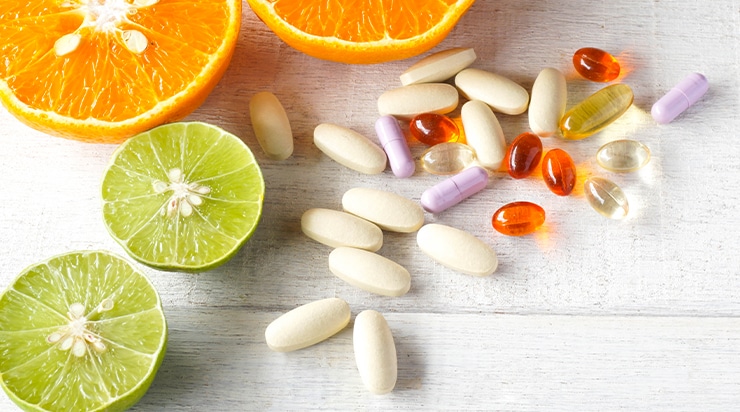The Italian supplements market continues to grow both in traditional channels and, more rapidly, in direct sales and online channels starting from 2020.
The reference distribution channel continues to be the pharmacy, which alone represents 76.3% of the total Italian revenue (approximately 1.5 billion euros). The parapharmacy channel settles at 170.3 million euros. In third place, we find the online channel, which however records the highest growth rate compared to the previous year with a revenue of over 162.2 million euros (+49.4%). To close corners and shelves of super and hypermarkets, which recorded +12.7 percent growth. (Source New Line and Iri data for Integrators Italy Italian Food Union).
According to Avedisco data, among the best-selling supplement categories are Omega-3 supplements, vitamins, aloe beverages, and multivitamins; important sales volumes are also recorded for “meal replacement” products.
“More and more people choose to support their health and well-being through these products,” declares Alessandro Golinelli, president of Integratori Italia. “The pharmacy always remains the protagonist. What surprises, however, are the sales volumes of the online sector, which surpasses the parapharmacy channel in terms of units sold.”
In this scenario, Amazon advances another step in the online pharmacy market. On the national registry of notified supplements, updated by the Ministry of Health as of April 1st, there are 101 products from two Amazon private brands: Amfit and Solimo. The 61 references of the first “label” include sports supplements, protein powders, vitamins, and protein bars. Information on positioning and range of the private brand is scarce, but judging from what is seen on the showcase page set up by Amazon on its marketplace, Amfit appears to be aimed at a medium-high, premium audience that practices sports and is health-conscious.
More difficult instead to categorize the Solimo private brand, which encompasses the remaining 40 references notified by Amazon to the Ministry. The label is indeed a true “umbrella brand” under which the group markets everything from pet food to coffee capsules, from hand razors to personal care products. The notified products that appear in the Registry, in any case, include vitamins and multivitamins, plant or mineral extracts, and a dermocosmetic, with packaging that seems to wink at a mainstream audience.
The news is making a lot of noise in the sector and marks a new decisive step by Jeff Bezos in the online pharmacy market, in a segment, that of supplements, which sees e-commerce in great growth.
“Amazon’s is a move that was to be expected,” comments Marco Repezza, private label and retail marketing expert, “because supplements is a market that has always been in the crosshairs of large-scale retailers: high margins, steadily growing demand, products that are easier to manage than pharmaceuticals but are likened to the latter by many consumers. It’s not necessarily going to be a success, Amazon has already scored several flops in the past, but it will serve the group to gain experience and make itself known.”
Still, it is a sign that the segment is very interesting to preside over; it is a marketing modality that has among its advantages that it is simple and convenient for consumers and allows companies to reach more customers in more countries.
However, even for selling on Amazon, it is necessary to comply with the numerous regulations in force on the subject to ensure the distribution of safe and compliant products. In fact, Amazon Italy is inviting companies intending to market their supplements through Amazon’s online sales channel to adapt to national and European requirements and to also confirm the completion of the operation before sale.
Other Amazon offices are operating in the same way. Therefore, Italian companies that want to market their products in other European countries using Amazon’s platform must first verify what the national legislation of that country is regarding the specific products.
To be able to sell a food supplement in Italy and other European Union countries, it is necessary to comply with the relevant European and local regulations in force in that particular country. These impose that the product contains only permitted ingredients, that the relevant labels are appropriately prepared in accordance with the regulations and therefore notified to the competent Authority, where required.

THE REGULATIONS
Amazon reserves the right to reject the product and, to help sellers, has compiled a compliance checklist:
Original supplements must be sealed in manufacturer’s packaging
Supplements must be new and unused
Supplements must clearly show identification codes placed on the packaging by the manufacturer or distributor, such as barcodes, batch numbers, or serial numbers
Supplement labels must be in English and contain the following information:
– The name of the food supplement
– The total quantity or capacity of the food supplement (e.g., 100 tablets, 5 mg, 6 oz)
– A table with components (“Supplement Facts”)
– The list of ingredients
– The name and address of the manufacturer, packager, or distributor
Supplement labels must not indicate that the products cure, alleviate, treat, or prevent diseases in humans, unless such declaration is FDA-approved
Supplement labels must not state that the products have the same effects as controlled substances or prescription medications (e.g., supplements cannot have names that can be confused with controlled substances or prescription drugs such as “Viagrex” or “TestosterX.”)
Supplement labels must not state that the supplements are “FDA approved”
Supplement labels must not use the FDA logo
Supplement labels must not indicate “test,” “not for sale,” or “not for resale”
Detail pages should include the following information:
– The name of the food supplement
– The list of ingredients, including an image of the ingredient list from the product label
– Pages must not indicate that products cure, alleviate, treat, or prevent diseases in humans, unless such declaration is FDA-approved
– Pages must not include disease names in keywords
– Pages must not indicate that products have the same effects as controlled substances or prescription medications
– Pages must not state that products cause an effect similar to anabolic steroids, such as “legal steroids”
– Pages must not indicate that supplements are “FDA approved”
– Images on detail pages must not include the FDA logo
For more information see: Recalls, Withdrawals, and Safety Alerts
Supplements must not contain ingredients banned by the FDA
Supplements must not be recognized as contaminated (e.g., dangerous or lacking proof of safety) or misbranded (e.g., with false or misleading label information) in an FDA warning letter
Supplements must be safe for use and must not be a product that the FDA has stated poses an unreasonable risk of injury or illness, such as products that contain pure caffeine powder
Supplements must not be listed by the Federal Trade Commission (FTC) as having untruthful marketing communications
Supplements must not contain controlled substances such as:
– cannabidiol (CBD), a Controlled Substance in Category I (“Schedule I”)
– substances listed in Categories I, II, III, IV or V (“Schedule I, II, III, IV, V”) of the Controlled Substances Act (for more information see: Controlled Substances Categories)
– chemicals in List I (“List I”) or their derivatives as prepared by the Drug Enforcement Administration (DEA) (for more information see: Chemicals in List I and II)
Supplements must comply with Amazon’s policies, including:
– the sale of supplements containing ingredients derived from sharks, whales, dolphins or porpoises is prohibited
– the sale of supplements containing more than 12% hydrogen peroxide is prohibited
– the sale of patches marketed as dietary supplements or detox products is prohibited
– the sale of Rhino brand male enhancement supplements is prohibited
The amazon storefront is again an excellent opportunity to develop a multichannel strategy, which will allow the pharmacist/parapharmacist/retailer to activate all touch points to increase sales.
